Background
Rippe Lifestyle Institute's mission is to help empower people to live healthier lifestyles. We do this by conducting research on simple, yet effective changes people can make in their lifestyle to achieve better health. Our research projects usually involve diet and exercise interventions since what you eat and how active you are are two of the most important factors for promoting good health.
How can I find out about opportunities to participate in research studies at RLI?
When we recruit for studies, we publicize studies a number of ways. We typically advertise in local newspapers. We always publicize opportunities to participate in studies on this Web site in the Current Research Studies section. Often times we send out announcements to former research participants. We also ask current participants to refer friends and family to our studies.
Who can participate in research studies at RLI?
Each study we conduct has different criteria participants must meet depending on the research question we are investigating. Age, gender, weight, health status and medication use are some of the most common criteria. It is important to remember that if you are excluded from participating in one study that does not mean you will not be eligible for future studies.
What are the benefits of participating in a research study at RLI?
The specific benefits of participating in research studies at RLI vary depending on the study, but in general research participants benefit from free medical assessments and free counseling from experts in nutrition and exercise. Because we often are testing treatments for various diseases and conditions, another benefit is free treatments or products including medications, dietary supplements, and food products. Perhaps the biggest benefit comes from the knowledge you gain while participating in a study. Knowledge is power when it comes to your health; the more you know about how to live a more healthful lifestyle, the more you can do to promote good health and longevity.
What are the risks of participating in a research study at RLI?
The risks of participating in a research study at RLI are fully disclosed in each study's "Informed Consent Form" that all subjects must read and sign before enrolling in a study. If at any time you have any questions or concerns about participating in a research study, please discuss your questions and concerns with a research professional.
Where can I find out more about what I may go through as a study participant?
Simply click on the links below to read more information on the testing procedures, counseling activities and research staff at RLI.
Analyzing Your Health with Standard Clinical Laboratory Tests
What do all these tests measure?
The Complete Blood Count (CBC) measures the levels, or counts, of the different types of cells in the blood. In particular, the CBC measures hemoglobin and hematocrit to detect the presence of anemia, red and white blood cell counts to detect the presence of infections, and a differential white blood cell count and red blood cell examination to assess cellular shape, size and distribution. The CBC requires drawing a small amount of blood from a subject.
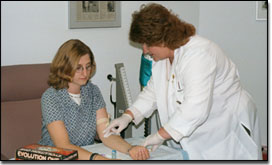
Urinalysis requires collecting urine from a well-hydrated subject. Results from urinalysis can help detect diabetes, acid-base imbalances, fluid or electrolyte disturbances, and urinary tract infections. Kidney function is assessed through urinalysis.
Glucose is assessed from a blood sample. An elevated blood glucose level may indicate the presence of diabetes. A fasting blood glucose level is the most specific, but least sensitive, method for diagnosing diabetes mellitus. Further testing is required to diagnose diabetes. In the event that further testing is warranted, subjects are referred to their personal physicians.
The lipid profile is a test that requires the participant to be fasting for 10 to 12 hours. Total cholesterol and triglyceride levels are measured in this profile, as well as a breakdown of the high density lipoprotein (HDL, the "good" cholesterol) and low density lipoprotein (LDL the "bad" cholesterol). Much of the research conducted at RLI is concerned with lifestyle changes and the lipid profile is used frequently to assess the effectiveness of dietary and activity interventions.
Liver function and electrolyte balance also are assessed from a blood sample.
All results of blood and urine analysis are discussed with each study participant and subjects are given copies of their results to review with their own health care providers.
How should I prepare for laboratory tests?
For tests in which you need to fast, only water should be consumed during the 10 to 12 hours before the blood sample is drawn. The research staff at RLI encourages you to drink plenty of water as it ensures proper hydration and makes drawing blood easier. Also, you are permitted to take any prescription medications during this time period.
Assessing Your Cardiovascular Fitness: The One-Mile Walk-Jog Test
What is the one-mile walk jog test?
This test consists of walking or jogging or a combination of both for one-mile around a quarter mile track. The duration of this test depends on how quickly you can complete the full mile.
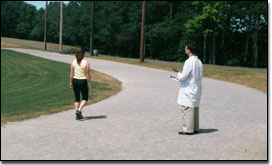
What does the one-mile walk-jog test assess?
By measuring how many minutes it takes you to complete the test, we can evaluate your cardiovascular fitness.
What if I can't finish the test?
Ideally, we would like to see all participants complete the test for research purposes; however, it is okay if you do not finish the test. We want to encourage you to do the best you can, but by no means should you suffer. You are always in control and may stop the test at any time for any reason.
How do I prepare for a one-mile walk-jog test?
Wear comfortable clothing and walking shoes appropriate for exercise, and drink plenty of water the day before your test so you are well hydrated.
Assessing Your Cardiovascular Fitness: The Three-Minute Step Test
What is the three-minute step test?
This test consists of stepping up and down on a 12-inch high step for three minutes. You will be asked to step at a rate of 24 steps per minute. You will step to the rhythm of a metronome that will produce an audible "click" at 96 beats per minute. With each click, you will make a movement and follow this sequence: up (right foot), up (left foot), down (right foot), down (left foot). After three minutes of stepping, you will sit down and an exercise physiologist will measure your heart rate (e.g. count your heartbeats) for one minute.
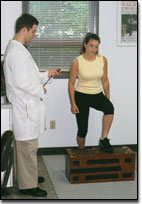
What does the three-minute step test measure?
By measuring your heart rate, a qualitative rating of your fitness level can be determined.
What if I can't finish the three-minute step test?
Ideally, we would like to see all participants complete the test for research purposes; however, it is okay if you do not finish the test. As with all other assessments we do, you are always in control and may stop the test at any time. If at any point during the test you feel dizzy, nauseous, light-headed, experience chest pain, or simply feel you can't go any further, the test will stop immediately.
How should I prepare for the test?
Wear clothes that you feel comfortable exercising in and comfortable walking shoes appropriate for exercise.
Assessing Your Cardiovascular Fitness: The Treadmill Test
What is a treadmill test?
A treadmill test is also known as an exercise tolerance test (ETT) or VO2 Max test. This test is designed to determine how well your body, and in particular your heart, can handle the stress of exercise. The test consists of the research participant walking, jogging or running on a treadmill for as long as he or she can. Once the participant feels he or she cannot continue, the treadmill is stopped and the test is over.
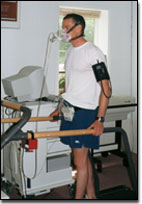
What does a treadmill test measure?
This test measures a ratio between the amount of oxygen you inhale and the amount of carbon dioxide you exhale. This ratio tells us how efficiently your body is using oxygen for a fuel, which ultimately gives us a gauge of your fitness level. During this test an electrocardiogram (ECG) machine is used to monitor your heart. The exercise physiologist will attach eight electrode pads to various locations on your chest. The electrodes will be attached to the ECG machine. The ECG machine, which shows your heart's activity, is used primarily by our cardiac nurse who will check the initial health of the your heart as well as constantly monitor your heart during the test.
What if I can't do this test?
Since many people aren't familiar with walking on treadmills, there will be time before the test begins for you to get familiar with the treadmill so you will be used to walking on it by the time the test starts. It is also very important to note that you have total control over the test. If at any point during the test you feel dizzy, nauseous, light-headed, experience chest pain, or simply feel you can't go any further, the test will stop immediately.
How can I prepare for a treadmill test?
You can prepare for a treadmill test by walking on a treadmill in a fitness facility or in your home. This test is very simple and anyone can finish it with great success so there should be no need to worry. If you have any concerns, please discuss them with one of the research professionals at RLI.
What should I wear for the treadmill test?
Please wear comfortable shorts, a loose fitting short sleeve T-shirt or tank top and comfortable walking shoes appropriate for exercise with socks. Women are encouraged to wear properly fitted sports bras for the test.
Assessing Your Usual Food Intake: The Three-Day Food Diary
What is a Three-Day Food Diary?
A Three-Day Food Diary is simply a complete list of ALL foods and beverages that have been consumed over a three-day period. And when we say complete list, we mean complete! Everything that enters your mouth should be written down including sips, nibbles, tastes and schmidgens. It is important to carry your diary with you and record foods and beverages as you consume them. Research shows we have a short memory for foods we eat, so we ask you to not rely on memory but instead record as you go so we can get the most accurate information on your dietary intake.

What information should be included in a three-day food diary?
You will be given specific forms on which to record your three-day food record. A research dietitian will instruct you on how to fill out the forms and tell you which three consecutive days to record your intake. The following information should always be recorded in your food diary:
- Time you consumed the food, beverage, meal, snack or nibble
- Place where you ate
- Food Item- being as specific as possible by writing down brand names, food preparation methods and if anything was added to the food such as salt, mustard, margarine, cream, etc.
- Amount consumed
What does a three-day food record tell us?
A research dietitian will enter your information from your 3-day record into a computer software program called Nutrition Data System for Research software (NDS-R), a high-powered nutrient analysis program developed by the University of Minnesota. The software program calculates an estimate of your daily dietary intake and provides information on your intake of 132 different nutrients! Different studies focus on different nutrients. In some studies we may want to know, on average, how many calories you are consuming each day. In other studies we may focus on your average intake of micronutrients such as calcium or folate.
Determining What You Ate Yesterday: The 24-Hour Dietary Recall Interview
What is a 24-hour dietary recall interview?
During a 24-hour dietary recall interview, you will meet with a Registered Dietitian to discuss all foods and beverages you consumed during the 24 hours prior to the interview. With the aid of food models and memory prompts, you will be asked to describe in detail all foods and beverages you consumed. The interview is guided by a computer program; while you are being interviewed by the research dietitian, she or he will enter information into a computer.
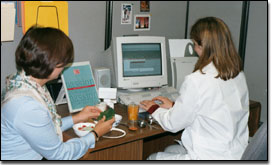
What does the 24-hour dietary recall interview assess?
Your food and beverage intake will be analyzed using the University of Minnesota Nutrition Data System for Research (NDS-R), which is a high-powered software package designed for use in research settings. The NDS-R software program calculates your energy, protein, fat, carbohydrate, vitamin and mineral intake during the prior day. We compile your data with data of other participants in the same group to see how the group, as a whole, is doing in terms of nutrient intake. If we want to assess your nutrient intake in a more precise way, we will ask to you complete a 3-day food record, which gives us a more accurate picture of you average nutrient intake.
How do you prepare for a 24-hour dietary recall interview?
Fortunately, you do not need to prepare for a 24-hour dietary recall interview. All we ask is that you are as honest and thorough as you can possibly be. Rest assured, there are no wrong answers during a dietary recall interview.
Evaluating Hunger and Satiety at RLI
What is satiety?
Satiety refers to the feeling of satisfaction or fullness after consuming a meal or snack. Satiety is related to appetite regulation, hunger and the control of food intake.

Why does RLI evaluate satiety?
Appetite regulation is an important aspect of body weight management. For example, during intentional weight loss, preventing excess hunger and maximizing the level of satiety after and between meals can help make adherence to a diet more possible. Some scientists have found that levels of blood sugar and the hormone insulin may be involved in appetite regulation. Different foods may cause different responses in blood glucose and insulin, and different people may respond differently to the same foods under certain conditions. Some components of foods that may affect such responses, and thus hunger and satiety, include protein content, water content, different types of fiber, and the glycemic index. Therefore, at RLI we perform tests to help evaluate what determines these responses to help us understand how and why people become hungry and satiated. This may assist us and other scientists in discovering what are the best foods for body weight management.
How does RLI test satiety in a clinical setting?
One test of appetite regulation is called the Clinical Satiety Protocol. In this test, two types of breakfasts are compared on separate mornings before and after participation in a diet and/or exercise study. Volunteers come to the laboratory in the morning after fasting overnight for 10 hours. During the test, before and after eating the breakfast, the research volunteer completes questionnaires about hunger and satiety, and has blood samples drawn for glucose and insulin. The Senior Research Nurse places an indwelling catheter in the research volunteer's arm to obtain these blood samples and decrease the number of needle sticks. Questionnaires and blood samples are obtained at the following number of minutes after the meal: 15, 30, 45, 60, 90, 120, 150 and 180. During the three hours of testing, volunteers are free to read, write and/or listen to music, and a research staff member is always present.
Another way that appetite regulation is evaluated during studies at RLI is through the Daily Appetite Profile. This is a questionnaire that volunteers take home to complete over the course of three days. At certain times of the day, volunteers rate how hungry and satisfied they are. This information helps us to understand patterns of appetite in real-life settings.
Evaluating Your Endurance: The RLI Bike Test
What is the RLI Bike Test?
The RLI Bike Test is performed in our exercise physiology research laboratory on a stationary bike. There are two parts to this test. The first part of the test consists of 15 minutes of cycling at a set resistance based on your baseline fitness levels (as determined by your treadmill test results and your body weight). The second part of this test consists of another 15 minutes of cycling. During this segment we increase the resistance of the bike slightly and you pedal at a self-selected pace that you can maintain for 15 minutes.

What does the bike test assess?
We monitor your heart rate and how hard you feel that your lungs and your legs are working. We also measure the total work that you do in the second half of the test to evaluate your cardiovascular fitness and endurance.
What if I can't finish it?
All that we ask is that you put forth your best effort; if you can't complete the test for one reason or another, that's okay. For research purposes we would like to see all participants complete the test, but by no means do we want you to suffer. You are in control of the test and may stop at any time for any reason.
How do I prepare for it?
All you have to do is meet us in our research laboratory in comfortable clothing and walking shoes appropriate for exercise and be ready to ride a bike.
Improving Your Diet Through Nutrition Counseling at RLI
What type of diet should I follow to help me lose weight?
How can I achieve healthy cholesterol levels?
What's the best way for me to get more fiber in my diet?
If you listen closely, anywhere you go, you can hear people discussing the hottest "diet" or the newest "miracle" food on the market and the purported health benefits. Of course, with the overabundance of nutrition and health books available, you can find answers to these questions. However, the easiest and most effective way to answer all your questions (and the best way to discuss the hottest or newest nutrition issues) is to seek nutrition counseling from a registered dietitian.

What is nutrition counseling?
Basically, nutrition counseling entails meeting with a nutrition professional (specifically a registered dietitian) so that your current diet or food intake can be assessed and recommendations can be made for more healthful alternatives. The topics that can be discussed are endless and may include:
- Increasing fruit and vegetable intake
- Proper serving sizes and portion control
- Healthy fats and cholesterol
- Controlling your blood sugar (if you have diabetes) through diet
- Recommended Daily Allowances (RDAs) for vitamins and minerals
- Adequate water intake
- Healthful vegetarian eating
- Safety and effectiveness of herbal supplements
- Shopping tips and menu planning
Why is nutrition counseling a valuable part of the research experience at RLI?
Nutrition counseling at RLI is often part of research protocols. These protocols often specify exactly what topics to cover with research participants in order to meet the nutrition goals of the study. But even though the counseling is guided by the protocols for the study, the counseling is personalized to fit the needs of each subject. When a question is discussed, any answers or recommendations are highly individualized. Based on your medical history, or particular food preferences, or even your daily schedule, you can learn how to make effective and easy changes in your food intake to better your health. The more personalized the recommendations, the easier they will be to follow. The easier they are to follow, the more likely you are to get your life on the healthy track.
Background
Registered dietitians are health professionals trained in physiology, metabolism, biochemistry, nutrition and food. Registered dietitians focus on the effects of diet on health promotion and disease prevention/treatment. While many health professionals receive some basic training in nutrition, registered dietitians are uniquely qualified to provide individualized counseling in nutrition. In turn, this individualized counseling helps people make changes in dietary intake that will ultimately improve their health and well-being.

Registered dietitians must go through significant training overseen by the Commission on Dietetic Registration, the official credentialing agency for the American Dietetic Association (ADA), which is the professional organization representing dietitians in the United States. Training requires a minimum of a bachelor's degree, granted by a U.S. accredited college or university, and an accredited pre-professional experience/internship. During this internship period, individuals work in a variety of settings under the supervision of experienced registered dietitians to gain competency and to become eligible to sit for a credentialing exam for registration. To maintain registration status, registered dietitians must earn continuing education credits. This continual learning process ensures dietitians stay on top of the constantly growing body of nutrition research and knowledge. Because the field of nutrition is so vast, most registered dietitians use their continual learning process to specialize in a certain practice area. In addition, many registered dietitians continue with college or university affiliated education, as more than half of all registered dietitians in the United States have master's degrees.
What do registered dietitians do at RLI?
Rippe Lifestyle Institute employs registered dietitians as part of the research team to handle all aspects of research related to food and nutrient intake and analysis. Registered dietitians at RLI collect and analyze nutrition and food data; design menus, meal plans and recipes; and counsel subjects on a wide variety of topics related to nutrition and health. They also become involved in developing study protocols and coordinating nutrition-related studies. Most importantly, registered dietitians at RLI help research subjects meet the unique nutritional goals of each study as specified by the research design and protocol.
Background
Physiology is the study of how the human body functions. Exercise physiology focuses on how the body functions, acutely and chronically, when exposed to physical activity. This includes many specific and interrelated areas such as the cardiopulmonary system, the neuroendocrine system, and the musculoskeletal system. Many exercise physiologists also are trained in nutrition, psychology, behavior modification, and other areas which allow them to help others make exercise a part of their lives.

What do exercise physiologists at RLI do?
Exercise physiologists at RLI primarily are responsible for administering physiological testing for studies. These tests include stress tests, body composition assessment, girth measurements, bicycle tests, walk/jog tests and more. Exercise physiologists at RLI also are responsible for creating and implementing exercise programs for those in our studies. They will counsel you on how to make exercise part of your life, which plays a vital role in achieving and maintaining good health. Exercise physiologists at RLI also are happy to help you with any questions you may have regarding exercise.
Background
A registered nurse (RN) is a graduate of an accredited school of nursing who has passed an intense examination administered by the State Board of Registration in Nursing in order to become a licensed practitioner. In order to comply with state regulations and maintain registration status, the registered nurse must submit evidence of receiving fifteen contact hours of continuing education at each time of renewal.

Nursing is an art, science, and discipline based on the natural, behavioral, and social sciences. It is an independent, autonomous, and self-regulating profession whose primary responsibility is to help the public achieve its highest level of health. The scope of practice for nurses is defined by state Nurse Practice Acts. Nurses utilize the nursing process and holistic approach to assess the individual's healthcare status, develop and implement nursing interventions that will assure continuity of care, and evaluate patient outcomes. Nursing involves the promotion of health, prevention of illness, assistance in the cure of disease, and provision of support to the dying patient.
What do registered nurses do at RLI?
The nursing staff at Rippe Lifestyle Institute has multiple roles and responsibilities. They monitor and supervise all clinical activities and emergency procedures, as well as perform physical assessments on study participants. Nurses at RLI are study coordinators and also help develop and institute study protocols. In addition, they are responsible for educating other staff members on new clinical policies and procedures.
To inquire about study opportunities contact Rippe Health today.



